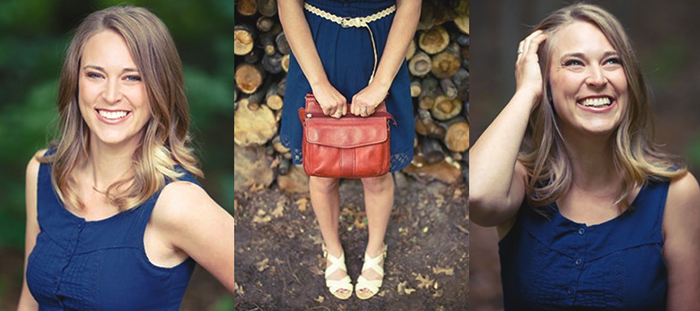I’ve never met Addie Zierman.
The world is a big place with lots of wonderful people in it, so it’s not particularly remarkable that I haven’t met everyone in person.
But it is a little funny, I think, that Addie and I lived in the same town for years, graduated from the same college, and didn’t become friends until after I had traded in the frozen streets of Minneapolis for the winding back roads of the South. Addie is actually sort of to blame for this blog’s existence — my first post was inspired by something she wrote for RELEVANT, though I didn’t realize it was hers until much later.
In the few months that I’ve been reading her words, she’s quickly become one of my favorite writers. Yesterday she released her memoir When We Were On Fire, which is beautiful and heartbreaking and hopeful all at once and I like it so much. In the midst of all this excitement, she took a few minutes to chat with me about all of this — writing her life into a book, releasing it to the world, and what comes next.
Writing a book is such a long, amazing process. When did you feel like you were “finished”?
Honestly, this book went through so many drafts that I don’t even know how to answer that. I wrote my memoir piecemeal, essay by essay in grad school, then sort of stitched it together during my thesis year. The first time I had a full draft, I was in a freezing cold Panera and Dane was still just a baby. The second time, I was at a Caribou in Andover, and my Mom had been watching my kids all day so that I could finish a new draft for my agent. And after that, there were two or three more rounds of edits and touch-ups and questions. I think I never really felt like it was FINISHED finished. Maybe writers never do. At some point, you just run out of time and have to turn the thing in.
What was your response at that moment? Did you laugh? Cry? Feel a bit dead inside?
I finished going through the final proof in June in a rainstorm in Duluth. I was on a writing retreat by myself. I remember realizing that this would be my last chance to change things. I felt scared but resolute. A couple of times in the night, I got up and had to re-read a part in my hotel room to make sure it didn’t sound as terrible as my mind-monkeys were telling me it did. And then, finally, I sent it in. It felt like cutting a piece of me away — like freedom and loss all at once.
In the book, I notice a lot of details from your early childhood – street names, churches, stuff like that. How in the world did you remember all that stuff? Or did you just make it up?
We lived in the same community most of my life, and my parents still live there…so that’s probably part of it. But though I remembered the actual names, I changed many of them in the book out of respect for privacy and anonymity. I just felt like it would be best.
I also noticed that some of the chapters were written in the “second person”, to yourself. But only a few of them. What’s that about?
I love second person, and it probably does seem random as a reader. In my mind, it was very deliberate. I switched to second person when I wanted to pull up out of my own individual story a little bit. Because, in my mind, this isn’t really just my story — this is the collective story of an “on fire,” “Jesus Freak” generation of Christians.
In these specific chapters, I’m attempting to pull in more common threads — Amy Grant, True Love Waits, exciting youth conferences.Things that other readers might have experienced. I’m trying to let them into the story a little bit more, to give them space to connect to their own memories, and to let them see where it might be about something bigger than just Addie Zierman’s story. It might be, after all, about all of us.
I love how raw and intimate “When We Were On Fire” feels. What was it like to write about those deeply personal moments? Did you think about the fact that thousands of people would be reading it someday?
I didn’t really think about it at the time. Now I’m wondering if it wasn’t a giant mistake.
At the time, I wrote for healing, for closure, for forgiveness — of myself and of others. My professors said you should start at the pain — that the best writing always begins there. So that’s where I went.
What was the most difficult part for you to write?
Definitely Chapter 16 — the time period I refer to as “The Year of My Drinking.” Until this point, the book largely examines the impact the evangelical culture had on me. Here, though, it turns, and I admit to my own failures, my own darkness, my own pain-fueled mistakes. I cry every time I read it.
I know many people have said that they felt like “When We Were On Fire” was describing their own story. Why do you suppose that is?
I’m so glad that’s the case, and it never ceases to amaze me when people say this. To me, it’s the greatest compliment I can receive because I believe that when memoir is REALLY WORKING, it’s no longer just my story. It’s yours. Ours. Though the details may differ, we’re tapping into the larger stories that connect us all.
Is that a surprise, or were you expecting it?
It’s a beautiful surprise. And yet, it’s also the thing I was working so hard toward.
Was it difficult to tell your story without attacking certain people or churches, or even Evangelicalism as a whole?
I think in the early drafts, there was a lot more anger. But the writing and editing process is slow, holy work I think. As I wrote and wrote and rewrote, I feel like I found healing in many ways, and I realized that I wasn’t really angry. Not in the end. I was sad and confused. I was one of many doing the hard work of redefining and of learning to receive grace.
When I realized that this was what the book was really about, it became easier to forgive, as well as to notice the role my own brokenness played in the whole story. I think it’s easier to extend grace when you’ve finally understood how desperately you need it.
What’s next for you? Can we have another book soon?
I signed a two-book deal with Convergent, so I’m beginning the terrifying work of starting another book. Please don’t ask what it’s about. It will only stress me out.

Read my review of When We Were on Fire and enter to win a free copy of the book, or go ahead and buy it on Amazon. Check out “A Hundred Small Perfect Steps”, my contribution to Addie’s synchroblog this week.
Make sure you visit Addie’s blog too, and connect with her on Twitter and Facebook.
published October 16, 2013
subscribe to updates:
(it's pretty much the only way to stay in touch with me these days)

